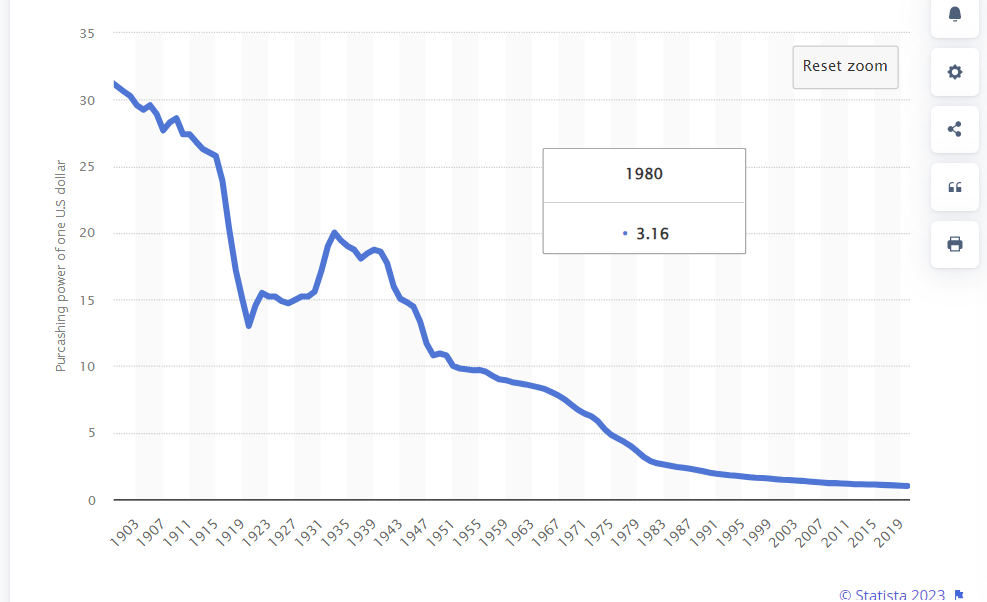- Make Crypto Simple
- Posts
- Busting Crypto Myths
Busting Crypto Myths
5 things you think about crypto that are DEAD WRONG

Make Crypto Simple
Crypto News and Concepts Made Simple - Straight to your inbox, every Monday and Friday
I talk to people every day about cryptocurrency… and let me tell you. I hear the same misconceptions almost every time.
Crypto is a winner-take-all game.
“Yeah, I believe that cryptocurrency and blockchain are here to stay, but how do you know which one? Which one will be the winner? You’re lying to yourself if you think you can figure out which one will win. That’s why I stay away!”
Cryptocurrencies have nothing backing them.
“Crypto is just made up internet magic! Can I hold a bitcoin in my hand? There’s nothing backing these things! That’s why I don’t buy them.”
Cryptocurrencies can only be used by the tech-savvy.
“Crypto is so complicated! You have to be a tech genius to figure that stuff out. Nobody that I know has been able to figure it out, so why would I think that crypto is for me?”
Cryptocurrencies are too volatile.
“Crypto is so volatile, so I stay away from the stuff. I prefer to keep my money in safer things, like stocks and cash.”
Regulation will kill cryptocurrencies.
“Governments hate crypto, they’ll regulate it out of existence. Why would I buy something that could get outlawed? Once this happens, it’s over for crypto.”
These are misconceptions that I used to have too.
It’s normal to believe what you hear from the media when you don’t understand the topic at hand. Don’t worry though. I’m here to clear things up.
If you’re still skeptical of cryptocurrency, this is an issue of Make Crypto Simple that you will not want to miss!

The Misconception:
One Crypto to Rule Them All?
Many believe that the crypto market is akin to a high-stakes battle royale, where various cryptocurrencies are pitted against each other in a fight for dominance. The expectation? Eventually, one crypto will emerge as the ultimate currency of the future, making all others obsolete.
🌐 The Reality:
Diverse Ecosystem, Multiple Winners: Cryptocurrencies are more like companies in an industry, each with its own unique purpose, audience, and use case. Just as we have multiple successful tech companies, each excelling in its niche, the crypto world is teeming with a variety of projects, each thriving in its own right. Perhaps calling them crypto”currencies” was a mistake…. they’re not all trying to become the next world currency. Here's what this means:
Different Goals and Audiences: Some cryptos, like Bitcoin, aim to be digital gold – a store of value. Others, like Ethereum, are more about creating a decentralized platform for applications.
Coexistence is Key: Many cryptocurrencies can (and do) coexist, serving different needs. A crypto designed for fast transactions serves a different purpose than one focused on privacy or smart contract capabilities.
Collaboration Over Competition: In many cases, cryptocurrencies aren't in direct competition. They often target different problems and may even be complementary.
💡 Takeaway:
The crypto space isn't heading towards a single victor scenario.
It's an expansive and diverse landscape where hundreds of cryptocurrencies can thrive, each contributing uniquely to the digital economy. Just as we have a range of fiat currencies and a multitude of successful companies across various sectors, the same diversity and richness are what make the crypto world incredibly dynamic and promising. 🌟


🌪️ The Misconception:
No Backing, No Value?
A widespread belief is that cryptocurrencies lack any form of backing — unlike traditional currencies, which are often supported by governments. This misconception leads to doubts about the intrinsic value of cryptocurrencies.
💼 The Reality:
Backed by a Network and Technology: The true backing of cryptocurrencies comes from several robust pillars:
User Network: The value of a cryptocurrency is strongly linked to its network of users. A large and active user base can lend significant credibility and demand, thereby backing the cryptocurrency's value. Just like a social media company. Facebook, Twitter, etc. are valuable because people use them.
Underlying Technology: The blockchain technology behind cryptocurrencies is a powerful backing in itself. It ensures security, transparency, and decentralization, traits that give cryptocurrencies intrinsic value. Many have their own, specialized technology. Just a like pre-revenue technology company can be valuable because of the unerlying tech, a cryptocurrency can be as well.
Generated Revenue: Some cryptocurrencies are linked to platforms or projects that generate revenue. This can come from transaction fees, services provided, or other business models integrated with the cryptocurrency. Many earn millions and millions in revenue. Just like a traditional company can be valued by its revenue, so can a crypto project.
🔍 Deeper Insight:
Beyond Traditional Backing: While cryptocurrencies don't have backing in the traditional sense (like a gold reserve or government decree), their value is rooted in what they offer — A community of users, mind-bending technology, and real revenue.
💡 Takeaway:
Cryptocurrencies are far from being baseless digital tokens.
Their backing comes from the strength and innovation of their networks and technology, and in some cases, the real economic activities they enable. This modern form of backing is what sets cryptocurrencies apart in the financial world and drives their growing acceptance and integration. 🌍💡


👨💻 The Misconception:
Only for the Tech-Savvy?
There's a common narrative that navigating the world of cryptocurrencies is a complex affair, strictly limited to those with a deep understanding of technology. This perspective can be intimidating for beginners, making them feel that crypto is out of their reach.
🌍 The Reality:
Crypto for Everyone: The truth is, while cryptocurrencies and blockchain technology do involve a learning curve, they are becoming increasingly user-friendly:
Simpler Interfaces: Crypto platforms and wallets are continuously evolving to be more intuitive and accessible, catering to users with varying levels of tech expertise.
Educational Resources: There's a wealth of information available for those new to crypto, from online courses to community forums, making the learning process manageable and even enjoyable.
Diverse Community: The crypto community is diverse, encompassing people from all walks of life, not just tech experts. This inclusivity encourages broader participation and learning.
💡 Takeaway:
Cryptocurrency is not an exclusive club for the tech-savvy.
With the advancements in user experience and the abundance of educational resources, anyone can embark on their crypto journey. The key is to start with the basics, be patient with the learning process, and actively seek knowledge. As the saying goes, "Every expert was once a beginner." Crypto is no exception to this rule. 🚀📘


🎢 The Myth:
A Wild Ride?
There's a prevailing view that the cryptocurrency market is excessively volatile, akin to a rollercoaster with extreme ups and downs. This perception can deter potential investors, who fear that the high volatility makes crypto investments too risky and unpredictable.
📊 The Reality:
Understanding Volatility in Context: While it's true that cryptocurrencies can experience significant price fluctuations, this volatility needs to be understood in a broader context:
Emerging Market Dynamics: The crypto market is relatively young and still evolving. This emerging nature contributes to its volatility, as it's more sensitive to market sentiment, regulatory news, and technological developments. As the crypto market continues to grow, volatility will decrease.
High Reward, High Risk: The flip side of high volatility is the potential for high returns. Some of the most successful crypto investments have yielded significant gains for early adopters, despite the market's ups and downs.
Comparative Volatility: Surprisingly, Bitcoin, often seen as the flagship cryptocurrency, has periods where it exhibits less volatility than certain traditional assets. For instance, during times of economic instability or market stress, some traditional stocks and commodities have shown greater price swings than Bitcoin. This challenges the notion that crypto is always the more volatile option.
Inflation and Traditional Assets: Traditional assets like fiat currencies, while typically more stable, are not immune to their own issues. The USD and other fiat currencies can suffer from inflation, diminishing their purchasing power over time. In some historical contexts, these assets have been among the worst performers, especially in economies experiencing hyperinflation. Have you ever seen a chart of the purchasing power of the US Dollar?

US Dollar Purchasing Power, 1093-2020.
It’s not pretty. Does that chart look appealing to you?
How about this one?

Bitcoin Price Chart
I prefer the second one.
Cryptocurrencies, especially those with capped supplies like Bitcoin, offer an alternative by being inherently resistant to runaway inflation.
💡 Takeaway:
Cryptocurrency's volatility is a characteristic of an evolving and dynamic market. While it presents risks, it also offers opportunities for high returns. A well-informed and strategic approach, including diversification and understanding market trends, can help navigate this volatility. 🚀📈


🚫 The Misconception:
The End is Nigh? A common fear is that government regulation could be the nail in the coffin for cryptocurrencies. The worry is that heavy-handed regulatory measures could stifle innovation and limit the freedom that defines the crypto space.
🏛️ The Reality:
Regulation Can Be a Good Thing: Here's a different perspective on the role of regulation in the crypto world:
Legitimacy and Stability: Sensible regulations can actually enhance the credibility and stability of the crypto market. This can attract more mainstream investors and users who were previously wary of the crypto space's "Wild West" reputation.
Regulatory Arbitrage: If a particular country enacts overly restrictive crypto regulations, it doesn't spell doom for the industry. History has shown that businesses, innovators, and capital tend to migrate to more crypto-friendly environments. The decentralized nature of cryptocurrencies makes them inherently resistant to being confined by the borders of any single nation.
💡 Takeaway:
The narrative that regulation will destroy cryptocurrencies is overly simplistic. In many ways, regulation can be a stepping stone towards the maturation and wider acceptance of cryptocurrencies. It's a complex dance between innovation and regulation, and the crypto community is well-equipped to adapt and thrive in this evolving landscape. 🌐🔧

The media, governments, and corporations alike want you to believe these crypto myths. Why? It benefits them. They’ve realized that this stuff is here to stay… and the worst thing that can happen for them is mass adoption before they can sufficiently fill their own portfolios.
The fear and skepticism fueled by these myths serve to slow down public adoption, buying these entities time to establish their own positions in the crypto market. By casting doubt on the security, stability, and viability of cryptocurrencies, they create a landscape of hesitation and uncertainty.
This strategy is not just about delaying mass adoption; it's about maintaining control and influence in a financial system that is evolving beyond their traditional realms of power.
The decentralized nature of cryptocurrencies threatens the centralized control that these institutions have long held, and as they scramble to adapt, perpetuating misconceptions becomes a tool to temper the pace of change.
Don’t get caught in the trap.
Book a 1 on 1 consulting session and start or accelerate your crypto journey. https://www.makecryptosimple.xyz/launch
For a limited time, they’re 100% FREE. Book one now. You won’t be sorry.
As always, thank you for reading Make Crypto Simple.
Sincerely,
Chris Schawel
The content provided in this newsletter is for entertainment purposes only and should not be construed as financial advice. All information, including but not limited to market analysis, price predictions, and investment strategies, is purely speculative in nature. We strongly recommend conducting your own research and consulting with a qualified financial advisor before making any investment decisions. We are not responsible for any losses incurred as a result of the information presented in this newsletter.